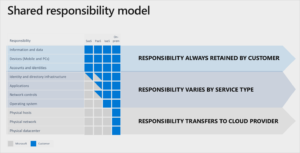Managing the Cloud: In-House or Managed Cloud Services Partner?
Your organization knows moving certain workloads to the cloud is a critical step in transforming and future-proofing your business. Among constantly evolving technology, hosting your applications in the cloud will help you keep pace with rapid innovation. Congratulations on taking that strategic step.
But simply being in the cloud isn’t enough — you have to manage, maintain, and protect your cloud environment while ensuring your tech stays up to date. There’s no one way to manage these assets, and no universal “playbook” available, and what works well for one organization could spell trouble for another. While there are many options for proper cloud management, it ultimately boils down to a decision between keeping it in-house or working with a cloud services partner.
Before making a decision that could affect your business for years to come, make sure you understand how each of these approaches could help your business manage this critical architecture and potential challenges.
Why DIY?
A DIY — or “do it yourself” — cloud solution means your organization manages and maintains the applications, tools, and cloud infrastructure itself using in-house talent. Or, your business may choose to work with several vendors to perform specific tasks and accomplish various outcomes.
When you employ a DIY cloud management strategy, you have the benefit and comfort of knowing your IT team understands your business inside and out. In-house staff is already familiar with your systems and processes and may already have relationships with department leads throughout the organization. Plus, working with on-site cloud managers means you may be able to solve issues and make quick fixes in a more timely manner than a third-party partner could.
With the benefit of managing your cloud within the business comes the cost of recruiting, training, and paying highly sought-after specialized IT professionals. Managing complex cloud infrastructure and application stacks requires skills and expertise your business may not be equipped to take on without bringing in new talent.
Another aspect of managing the cloud is setting up and maintaining a secure cloud environment. Security and compliance are a “shared responsibility” between the cloud provider and the customer. While the cloud provider operates and controls the components from the host operating system down to the physical security of the facilities – this still leaves the customer to assume responsibility for OS-level updates/security patches, the configuration of security group rules and configuration, and maintenance of many other related services. Both AWS and Microsoft outline what type of activities fall within the customer responsibility in this model – for further reading please refer to the links provided.
The Microsoft Azure Shared Responsibility model is shown below for illustrative purposes.

Opting for a DIY solution also means your IT team will be spending far more time on cloud maintenance tasks than focusing on core tasks to move your business forward, as well as re-factoring applications, developing native-cloud applications, etc. And while your cloud operates 24/7, your employees don’t — so after-hours support may be limited or unavailable. Typically, this type of work is what is referred to as undifferentiated and many companies will outsource activities that fit within this framework.
Why Work With a Managed Cloud Services Partner?
Your business will likely save hours of time, many thousands of dollars, and numerous headaches when you work with a managed cloud services provider. With a trusted partner at your side, your organization can stay ahead of any issues with proactive recommendations and technical insight — and access to 24/7/365 support means you can rest assured your cloud environment and applications are in good hands.
Rather than spend resources on ensuring you have the right internal staff in place to manage your cloud, a managed cloud services provider will supplement your in-house team with the highly skilled and specialized professionals your cloud requires. This allows your business more flexibility and increased scalability as you need to expand or transform your tech stack.
While your managed cloud provider may not be on-site, the right partner will continuously and proactively work with you to ensure your environment is optimized and secure for your business. That means your teams can focus on growing your business, building new applications, engaging deeper with customers, and staying ahead of the curve in terms of what comes next.
The path of any business’s digital transformation will be unique — and once you’re operating in the cloud, the same holds true. There isn’t a one-size-fits-all approach to cloud management, and it’s critical to examine the challenges and benefits of each option to determine which solution will fit your organization best. But as cloud infrastructures become increasingly complex, the case for managed services grows, and, according to 451 Research, the majority of companies expect to work with a partner in the next two years to increase cost-effectiveness, improve performance, strengthen security, and more.
If you’ve found the advantages of working with a managed cloud provider outweigh those of managing your cloud environment in-house — and you’re ready to take advantage of certified expertise, 24/7 support, and a tailored solution built for your business — contact Centrilogic today.